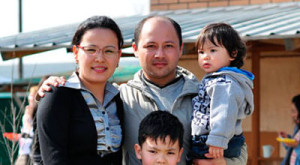 A pastor from the central Asian country of Uzbekistan has been released from prison and granted asylum in Europe after being held for three months on charges that he practiced religion outside of state regulations.
A pastor from the central Asian country of Uzbekistan has been released from prison and granted asylum in Europe after being held for three months on charges that he practiced religion outside of state regulations.
Pastor Makset Djabbarbergenov, 32, was first detained by police in Kazakhstan in September of this year after he fled to the country to seek refuge and religious freedom. Kazakhstan refused to assist Djabbarbergenov, however, but rather followed orders from the pastor’s homeland of Uzbekistan, who sought to have him returned to face criminal charges for operating an illegal church. Officials stated that they were unable to locate any documents pertaining to Djabbarbergenov’s application to be granted asylum in the nation, and therefore could not shield him from the Uzbek government.
During an October hearing, “one of the original Uzbekistan charges against Djabbarbergenov no longer was part of the record: a charge of storing and distributing religious literature that carries a 3-year maximum prison sentence,” reports Open Doors USA. “In its place appeared a more serious charge of leading a ‘religious extremist’ group, which carries a 5 to 15-year sentence.”
“I and our older children are praying for Makset. We all miss him very much,” Aigul Djabbarbergenov told reporters during her husband’s incarceration. “But [we] pray that we can follow God and He’ll lead us to be where He wants us to be. We want Him to solve and resolve the situation and tell us what to do.”
The United Nations High Commission for Refugees is stated to have participated in arranging Djabbarbergenov’s release and asylum. Representatives met him at the prison this week and helped him to flee to an unnamed European country, ensuring that his departure was successful.
As he was transported to the airport, Djabbarbergenov was able to meet Aigual and their four small children, who joined him in the flight into Europe. According to reports, border guards in Kazakhstan told the pastor that he is prohibited from re-entering until 2017.
In addition to receiving assistance from the Commission, Christian agencies also credit as integral the almost 3,800 supporters who sent emails in support of Djabbarbergenov as part of an advocacy campaign launched on his behalf.
“We are incredibly grateful for Makset’s release and thank all of our supporters who advocated on his behalf by sending emails to the Kazakh ambassador to the United States,” says Open Doors USA Advocacy Director Lindsay Vessey. “It is good to hear that the UNHCR played a critical role in securing his release as well as in ensuring Makset’s safe departure from Kazakhstan with his family.”
Djabbarbergenov became a Christian in 2000, and since then, he has been actively sharing his faith in Uzbekistan, despite laws that prohibit him from doing so. He has been arrested six times following a police raid in 2007.
Uzbekistan is listed as the seventh worst place to live as a Christian, as it is known for its persecution of those who profess faith in Jesus Christ — as well as those of various religions. The U.S. State Department has also marked the nation as a “country of particular concern,” based on recommendations from the U.S. Commission on International Religious Freedom.
“The Uzbek government violates the full range of human rights and harshly penalizes individuals for independent religious activity regardless of their religious affiliation,” the Commission outlined in its 2012 annual report.
According to Open Doors USA, there are no registered Protestant churches in the country, as they are considered illegal.
Become a Christian News Network Supporter...


